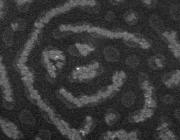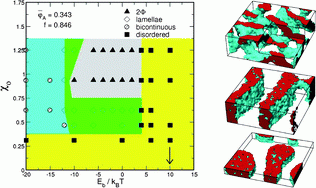Citation:
Abstract:
We develop a mesoscopic density functional theory (DFT)-based Monte-Carlo approach for studying the phase behaviour of multi-component systems comprised of irreversibly bonded, conventional macromolecules and supramolecular entities. The latter can reversibly associate with each other and the conventional components to ``living'', equilibrium polymers. The computational approach can be applied to a broad class of supramolecular systems and we focus here on quasi-block copolymer systems that contain conventional, ``dead'' AB-copolymers with a supramolecular B-terminus and supramolecular B-units. The simulations show that, by properly selecting the architecture of the ``dead'' copolymers and by varying the supramolecular association constant and the incompatibility between the segment species, A and B, one obtains a variety of different microphase-separated morphologies and macrophase separations. Two representative phase diagrams are reported as a function of the association constant, E(b), and the Flory-Huggins parameter, chi, quantifying the repulsion between A and B segments. The simulation results are qualitatively rationalised by considering the dependence of the stoichiometry on the system's parameters, and fractionation effects between coexisting phases are illustrated.





